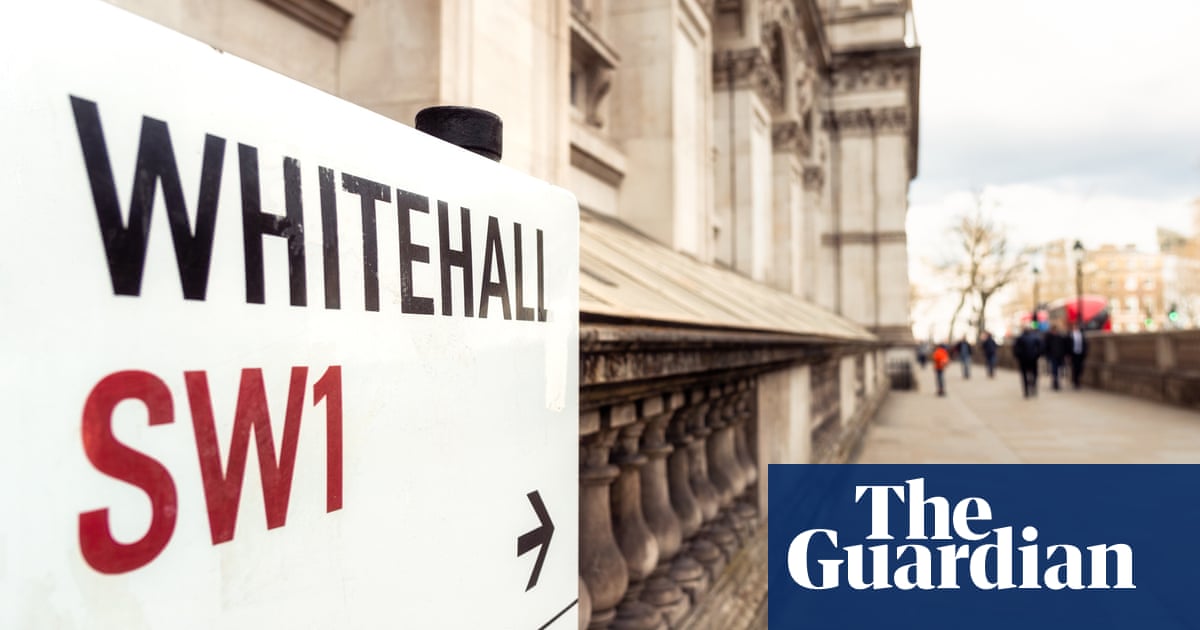
A senior civil servant has said Cabinet Office officials making policy on small boats referred to “bloody migrants” and were expected to “leave their humanity at the door”.
Rowaa Ahmar withdrew a tribunal claim alleging “unrelenting and systemic” racism in the department on Wednesday but said she stands by the substance of it.
In an interview with the Guardian, Ahmar described “inhumane conversations” that took place in the illegal migration taskforce, where she was head of policy in 2022. She said those creating the Rwanda scheme ignored legal advice and told her to let them ambush the Treasury with the cost to push the scheme through.
Ahmar, who is of Egyptian and French dual heritage, said she raised concerns about racism and was increasingly blocked from meetings before being told that her secondment from the Treasury was ending abruptly for “poor behaviour”.
The taskforce was convened to tackle the arrival of small boats across the Channel. Ahmar said they were advised by France that it was unacceptable to use turnaround tactics of sending boats back because of the “huge risk” but that “people in the room didn’t care if these people would die”.
When the likely high cost of the scheme emerged, she said: “I was told: ‘Do not mention it to the Treasury, we want to ambush them.’ And basically, this is what they ended up doing, they ambushed them, they spent the money … it’s taxpayers’ money on the floor.”
An employment tribunal hearing against the Cabinet Office and senior civil servants began on Monday alleging a “hostile racist working environment” but the case was withdrawn on Wednesday. Ahmar had lodged two claims arguing she was subject to “direct discrimination and harassment on the grounds of her sex and race” as well as “victimisation”.
The Cabinet Office said her claims were “completely unfounded” and noted that Ahmar had withdrawn the case with no payment made. She said she walked away because she was starting a new job on Friday and did not want to spend a month in court.
Describing the discussions that led to decisions on small boats, she said: “I was privy to some inhumane conversations using the words ‘let’s boomerang them’, ‘bloody migrants’, ‘let’s take them in Cat C and treat them as prisoners.’”
She added: “I can’t reveal the legal advice, but I was pushing for the legal advice to be respected.”
Ahmar said in court papers that she tried to focus small boats policy on criminal gangs and move the debate “away from prejudice and blame” but that managers “were on board for the racist ultra-hostility which a boomerang (‘no returns’) policy would involve” and saw her as an “unwelcome visitor to their taskforce”.
In the interview, Ahmar said that “the whole illegal migration taskforce was really clumsy, made of people who don’t know anything about migration or really understand why people would want to come to this country”. She added: “What’s happening now to the Rwanda scheme is the fault of the taskforce.”
The Rwanda bill now faces further delays after resistance in the House of Lords as its costs escalate.
Ahmar said the taskforce was “looking into migration from a very narrow point of view” and that they “didn’t want to look into safe and legal routes” to bring asylum seekers to Britain.
Ultimately, Ahar said, she “didn’t really feel comfortable being head of policy in a taskforce where they talk about things like [using] turnaround tactics, so they can just die, basically.” She said: “The civil servants are all white. They don’t understand how hard it is for migrants to be here.”
after newsletter promotion
Ahmar said in the papers: “I believe that speaking up against racism was a career death sentence at the [taskforce].”
The Cabinet Office argued in documents that her behaviour in the first six weeks at the taskforce was “negative and problematic, leading colleagues to feel overburdened, disrespected or undermined” and “received concerns” that the behaviour “amounted to bullying”.
Ahmar first took a secondment from the Treasury to become a chief of staff before Cop26 in 2021, before being ordered to leave the climate summit early after complaining of bullying and harassment.
In an internal investigation it was found that a “bullying, harassment and discrimination” complaint she brought against a manager was “partially upheld”, with behaviour that “amounted to bullying”, but that there was “no malice” and it was an issue of communication.
Ahmar was a civil servant for 12 years and said that she excelled at the Treasury, admired colleagues and found it a good place to work but that the Cabinet Office was very different. She said she encountered “people in high grades who are very incompetent” and that they “did not know how to make policy”.
She said her motivation was not political but that she wanted to hold the Cabinet Office to account.
The Cabinet Office said the allegations in Ahmar’s case were “completely unfounded” and that she had raised 82 issues and named at least 27 individuals.
It added: “The Cabinet Office has always firmly denied all of the claims in this case. We were prepared to robustly defend them in court. The entire case has now been withdrawn by the claimant, and no payment has been made, including for her legal costs.
“As we set out in our response to the court – the claims include a great deal of bare assertion, often of an extremely serious nature, with no supporting evidence. Some of their own evidence is inconsistent and there is often obviously contradictory evidence.
“The hard-working civil servants in the illegal migration taskforce were delivering one of the government’s top priorities. They have supported the arrest of hundreds of people smugglers and prevention of tens of thousands of dangerous small boat crossings.”